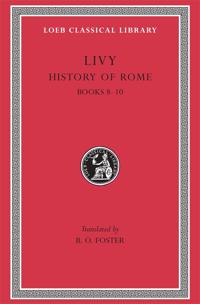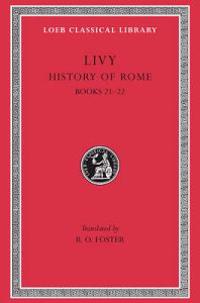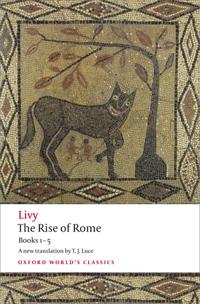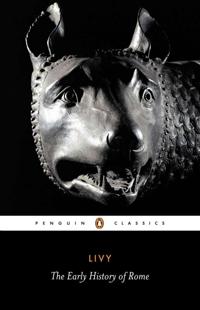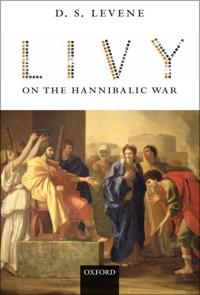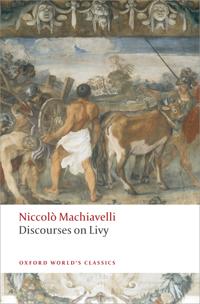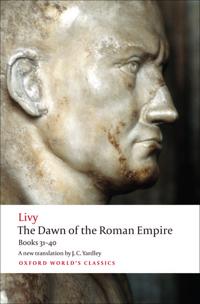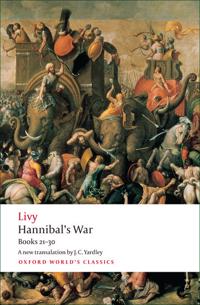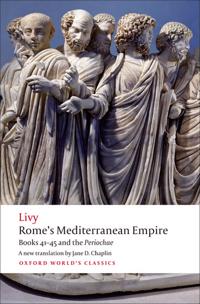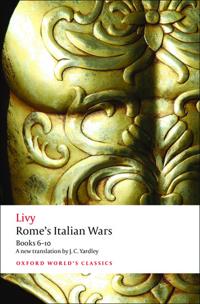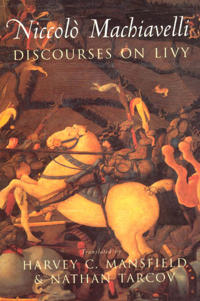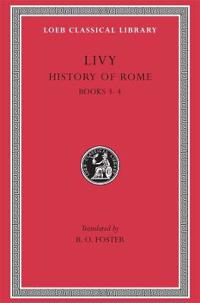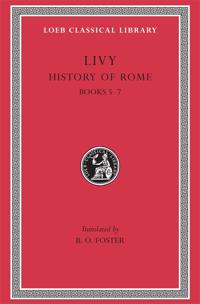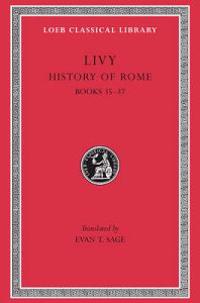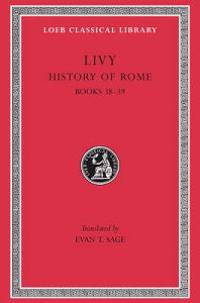Livy (Inbunden)
avLivy, B. O. (TRN) Foster, Livy
ISBN: 9780674991262 - UTGIVEN: 1976-06The only extant work by Livy (64 or 59 BCE 12 or 17 CE) is part of his history of Rome from the foundation of the city to 9 BCE. Of its 142 books 1 10, 21 45 (except parts of 41 and 43 45), fragments, and short summaries remain. Livy s history is a source for the De Prodigiis of Julius Obsequens (fo[...]
Livy, Books Viii-X (Inbunden)
avLivy
ISBN: 9780674992108 - UTGIVEN: 1970-12Livy (Titus Livius), the great Roman historian, was born at or near Patavium (Padua) in 64 or 59 BCE; he may have lived mostly in Rome but died at Patavium, in 12 or 17 CE. Livy's only extant work is part of his history of Rome from the foundation of the city to 9 BCE. Of its 142 books, we have jus[...]
Livy, Books Xxi-Xxii (Inbunden)
avLivy
ISBN: 9780674992566 - UTGIVEN: 1977-12The only extant work by Livy (64 or 59 BCE 12 or 17 CE) is part of his history of Rome from the foundation of the city to 9 BCE. Of its 142 books, 1 10, 21 45 (except parts of 41 and 43 45), fragments, and short summaries remain. Livy s history is a source for the De Prodigiis of Julius Obsequens (f[...]
The Rise of Rome (Pocket)
avLivy, T. James Luce, Livy
ISBN: 9780199540044 - UTGIVEN: 200907'the fates ordained the founding of this great city and the beginning of the world's mightiest empire, second only to the power of the gods' Romulus and Remus, the rape of Lucretia, Horatius at the bridge, the saga of Coriolanus, Cincinnatus called from his farm to save the state - these and many mo[...]
The History of Rome (Inbunden)
avLivy, Valerie M. (TRN) Warrior, Livy
ISBN: 9780872207240 - UTGIVEN: 2006-09This edition features Valerie Warrior's crisp, fluent translation of the first five books of Livy's History; a general introduction to Livy and his work; extensive foot-of-the-page notes offering essential contextual information; a chronology of events; and three appendices offering additional insig[...]
The Early History of Rome (Storpocket)
avLivy
ISBN: 9780140448092 - UTGIVEN: 200203Livy (c. 59 BC AD 17) dedicated most of his life to writing some 142 volumes of history, the first five of which comprise The Early History of Rome. With stylistic brilliance, he chronicles nearly 400 years of history, from the founding of Rome (traditionally dated to 757 BC) to the Gallic invasion [...]
Commentary on Livy, Books Xxxiv-Xxxvii
ISBN: 9780198144557 - UTGIVEN: 1981-04A Commentary on Livy Books XXXIV-XXXVII
Livy on the Hannibalic War (Häftad)
avDavid S. Levene
ISBN: 9780198152965 - UTGIVEN: 2012-10Livy's account of the Hannibalic War in his Third Decade (Books 21-30) is our fullest source for one of the most crucial wars of all time; it is also a narrative history of unparalleled richness, drama, and depth. Levene examines such topics as Livy's construction of his narrative, his source-materi[...]
Commentary on Livy, Books 38-40, A: Challenges and Prospects in the Changing Global Aid Environment (Inbunden)
avJohn Briscoe
ISBN: 9780199290512 - UTGIVEN: 2007-12-13Discourses on Livy (Häftad)
avNiccolo Machiavelli
ISBN: 9780199555550 - UTGIVEN: 200812IDiscourses on Livy (1531) is as essential to an understanding of Machiavelli as his famous treatise, The Prince. Equally controversial, it reveals his fundamental preference for a republican state. Comparing the practice of the ancient Romans with that of his contemporaries provided Machiavelli wit[...]
The Dawn of the Roman Empire (Pocket)
avLivy, J. C. Yardley, Waldemar Heckel
ISBN: 9780199555680 - UTGIVEN: 200910'With a single announcement from a herald, all the cities of Greece and Asia had been set free; only an intrepid soul could formulate such an ambitious project, only phenomenal valour and fortune bring it to fruition. (Livy, 33. 33) Thus Livy describes the reaction to the Roman commander T.Q. Flamin[...]
Hannibal's War (Pocket)
avLivy, J. C. Yardley, Dexter Hoyos
ISBN: 9780199555970 - UTGIVEN: 200910'You know how to win a battle, Hannibal; you do not know how to use the victory!' Livy's great history of Rome contains, in Books 21 to 30, the definitive ancient account of Hannibal's invasion of Italy in 218 BC, and the war he fought with the Romans over the following sixteen years. Livy describe[...]
Rome's Mediterranean Empire (Häftad)
avLivy
ISBN: 9780199556021 - UTGIVEN: 200908'I will do as the Senate decrees.' These words from one of Rome's opponents encapsulate the authority Rome achieved by its subjugation of the Mediterranean. The Third Macedonian War, recounted in this volume, ended the kingdom created by Philip II and Alexander the Great and was a crucial step in Ro[...]
Rome's Italian Wars (Häftad)
avLivy
ISBN: 9780199564859 - UTGIVEN: 201304'People have it in their minds that he would have been a match for Alexander, had Alexander turned his arms on Europe.' So Livy characterizes Papirius Cursor, one of Rome's famous generals in the fourth century BC. In Books 6 to 10 of his monumental history of Rome, Livy deals with the period in wh[...]
Livy: The History of Rome, Books 21-25 (Titi Livi AB Urbe Condita Libri XXI-XXV)
ISBN: 9780199686162 - UTGIVEN: 2016-07Oxford Classical Texts, also known as Scriptorum Classicorum Bibliotheca Oxoniensis, provide authoritative, clear, and reliable editions of ancient texts, with apparatus criticus on each page. In this volume, Briscoe provides readers with a revised critical edition of the original Latin text of book[...]
Discourses on Livy (Pocket)
avNiccolo Machiavelli, Harvey C. Mansfield, Nathan Tarcov
ISBN: 9780226500362 - UTGIVEN: 199801"Discourses on Livy" is the founding document of modern republicanism, and Harvey C. Mansfield and Nathan Tarcov have provided the definitive English translation of this classic work. Faithful to the original Italian text, properly attentive to Machiavelli's idiom and subtlety of thought, it is emin[...]
Contemporary Theories of Learning (Inbunden)
avLivy
ISBN: 9780415473439 - UTGIVEN: 200812In this definitive collection of today's most influential learning theorists, sixteen world-renowned experts present their understanding of what learning is and how human learning takes place. Professor Knud Illeris has collected chapters that explain both the complex frameworks in which learning ta[...]
Spectacle and Society in Livy's "History" (Övrig)
avAndrew Feldherr
ISBN: 9780520210271 - UTGIVEN: 1998-08-15Public spectacle--from the morning rituals of the Roman noble to triumphs and the shows of the Arena--formed a crucial component of the language of power in ancient Rome. The historian Livy (c. 60 B.C.E.-17 C.E.), who provides our fullest description of Rome's early history, presents his account of [...]
Contested Triumphs: Politics, Pageantry, and Performance in Livy's Republican Rome (Övrig)
avMiriam R. Pelikan Pittenger
ISBN: 9780520241398 - UTGIVEN: 2009-01-05This path breaking analysis of Roman political culture in the middle Republic focuses on the concerns of the Roman Senate as it decided whether or not to award a victorious general triumphal honors. Miriam R. Pelikan Pittenger's strikingly original approach illuminates this process by examining seve[...]
Ab Urbe Condita (Inbunden)
avLivy
ISBN: 9780674991484 - UTGIVEN: 192212Livy (Titus Livius), the great Roman historian, was born at or near Patavium (Padua) in 64 or 59 BCE; he may have lived mostly in Rome but died at Patavium, in 12 or 17 CE. Livy's only extant work is part of his history of Rome from the foundation of the city to 9 BCE. Of its 142 books, we have just[...]
Ab Urbe Condita (Inbunden)
avLivy
ISBN: 9780674991903 - UTGIVEN: 197812Livy (Titus Livius), the great Roman historian, was born at or near Patavium (Padua) in 64 or 59 BCE; he may have lived mostly in Rome but died at Patavium, in 12 or 17 CE. Livy's only extant work is part of his history of Rome from the foundation of the city to 9 BCE. Of its 142 books, we have just[...]
Ab Urbe Condita (Inbunden)
avLivy
ISBN: 9780674993327 - UTGIVEN: 193512Livy (Titus Livius), the great Roman historian, was born at or near Patavium (Padua) in 64 or 59 BCE; he may have lived mostly in Rome but died at Patavium, in 12 or 17 CE. Livy's only extant work is part of his history of Rome from the foundation of the city to 9 BCE. Of its 142 books, we have just[...]
Ab Urbe Condita (Inbunden)
avLivy
ISBN: 9780674993464 - UTGIVEN: 1936-12Livy (Titus Livius), the great Roman historian, was born at or near Patavium (Padua) in 64 or 59 BCE; he may have lived mostly in Rome but died at Patavium, in 12 or 17 CE. Livy's only extant work is part of his history of Rome from the foundation of the city to 9 BCE. Of its 142 books, we have just[...]


